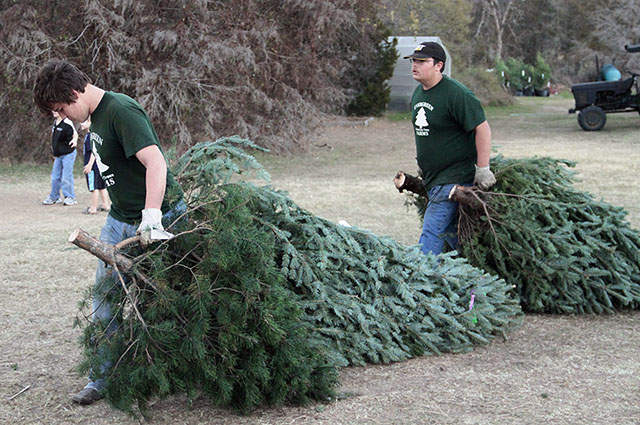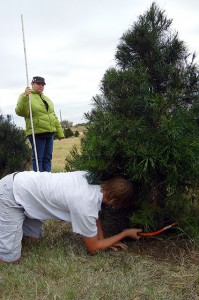Christmas Wish (and Twist) for Christmas Tree Farmers: Dry Weather

Jake Arbuckle and David Howe, employees of Evergreen Farms Christmas Trees in Elgin, unloading trees for shoppers. Photo by Oscar Ricardo Silva.
By Margaret Nicklas
For Reporting Texas
Christmas tree farmers dealt with more than heat and drought last year, as cold, wet weather during the holidays deterred buyers. So this season, growers in Central Texas are hoping for good weather as they replant trees and hope to attract customers back to their fields.
Cutting your own tree may cost as little as $22 or nearly $100 depending on the height of the tree, area growers say. Often, customers are carrying on a family tradition.
“We’ve had families coming since their kids were — as the saying goes — ‘knee high to a duck,’ and now they’re in college or have their own kids,” said Virginia Abrameit, owner of a tree farm in Luling.
Twyla Nash, who co-owns the Elgin Christmas Tree Farm with her husband, Marc, said they lost hundreds of young trees because of the conditions last year. Virginia pines are popular with the Nashes and other area farmers, but they require more water than native species.
“We lost probably 60 or 70 percent of the babies, so that’s going to affect our future growth,” Nash said. And of her thousands of Leyland cypress trees, a sterile hybrid popular with allergy sufferers, she only has about 10 big enough to sell this year, she said.
But the 100-acre farm, which devotes about 55 acres to trees, had plenty to sell last year despite the losses, and it still does.
“We have trees in the field to cut, and we plan to always have trees in the field to cut,” she said.
The greater impact to Nash’s business last year was the rain and cold that hit the area during the short Christmas buying season. Nearly 5 inches of rain fell last December, more than double the average, and temperatures averaged in the low 50s. The rain and cold discouraged shoppers from visiting farms.
“It rained. It was very cold. Several of the days we would have sold trees, and people did not come because of that,” she said.
As Mark Nichols put it: “Mother Nature kicked my fanny.”
Nichols is the owner of St. Nick’s Christmas Tree Farm, just north of Fredericksburg. He and his wife, Nancy, grow Afghan pines and several types of Arizona cypress on about four acres there. The drought was not a big issue for him, he said, because the trees he grows are desert natives. But the rain discouraged shoppers who did not want to cut trees in the wet and cold. Nichols has clay loam, he said, so even a few inches of rain created problems.
“There were some days when I just couldn’t open,” he said. “I had water standing in the field.”
Rain also affected Abrameit’s Tree Farm. Virginia Abrameit grows Virginia pines on about 15 acres with her husband, Archie. Since her farm typically only opens three weekends per year between Thanksgiving and Christmas, shopping weather on those days had a serious impact. Though the farm lost some trees due to heat and drought, sales were mostly affected by weather, she said.

Luann Chilson of Pflugerville watches as her grandson, Zack, cuts down a Virginia pine at Evergreen Farm the day after Thanksgiving. Photo by Margaret Nicklas.
“Two of those weekends we were blessed with rain, and a little cooler weather,” Abrameit said. “We still had trees to sell, but those sales were down a little bit last year due to the wet and the cool.”
Many area Christmas tree farms kicked off their 2012 season on the day after Thanksgiving, and so far, conditions have been mild and dry in Central Texas. A steady trickle of shoppers appeared at Evergreen Farms Christmas Trees in Elgin, choosing a tree to cut on site or a pre-cut tree from a stand.
“We have been very busy,” said Beth Walterscheidt, who owns the farm with her husband, Mike.
The drought was a major factor last year for the Walterscheidts because of the number of trees they lost on their 20-acre farm. “We didn’t let anybody cut last year,” Beth Walterscheidt said. Instead, they brought in more pre-cut trees than usual from Washington to satisfy customer demand.
“Our sales were a little down because people like the experience of cutting a tree,” she said. This year, the Walterscheidts have again brought in pre-cut trees but are allowing harvesting of several hundred Virginia pines, along with some Leyland cypress.
“We’ll keep the fields open until we feel like we’re cutting into next year’s crops,” she said.